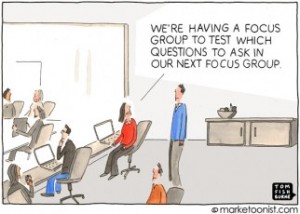As we mentioned in last week’s post, focus groups are a great way to gain a better understanding of your fundraising community. They can provide insight on how to improve an existing peer-to-peer fundraising event or campaign, and they can be used to test new concepts or strategies with your target audience.
This week, we’d like to share some more tactical advice on how to get it done…and done right.
So, here are seven things to keep in mind when conducting a focus group…
- Invite your entire audience.Make sure your focus group represents everyperspective within your P2P event or campaign. Invite some repeat participants and some who have never done it (but are part of the target demographic). Invite some older and some younger participants. Some top fundraisers and some who haven’t raised a single cent. Some leading a team and some participating on their own. Some happy with you and, more importantly, some who are not. We suggest you confirm at least two members from every “sub-segment” and expect that 10-20% will be a no-show.
- Make it convenient & comfortable.Pick a day time and location that is convenient for the community you plan to invite to the focus group. You meeting space should have comfortable chairs situated around a table so that participants can see/hear each other clearly and also take notes with paper and pens provided.
- Feed them.Keep attendees happy, not hungry. Provide easy-to-serve food (i.e. pizza) at the very beginning as a way to break the ice. It’s a great time to make introductions and go through the agenda.
- Stay objective. Usually the subject matter you are testing is very close your heart. Your judgement can be clouded and you can easily become defensive. Do your best to present concepts without prejudice, and make sure you treat all feedback you receive (positive andnegative) with equal respect. Of course this can be challenging, so you might want to consider using a consultant to facilitate the group on your behalf.
- Stay in control. It’s amazing how quickly a focus group can actually losefocus. Let participants know in advance that you’ll be keeping the conversation on-track…and that you’ll interrupt or redirect them if they happen to stray from the topic at hand.
- Stay open. While you may have packaged a few concepts in a particular way in order to test them…it’s okay to allow the focus group to deconstruct them. It’s helpful to understand which specificpieces of eachconcept they like and don’t like. Your final concept (or strategy) may end up being a combination of these aspects.
- Follow up. After the focus group, participants don’t justexpect a “thank you”. They have become invested in your P2P program…and will be curious to hear regular updates on how it has been developing. Keeping them engaged throughout the process will continue to bring value. They will help you refine your strategy and will become strong ambassadors for the program when it’s launched.


